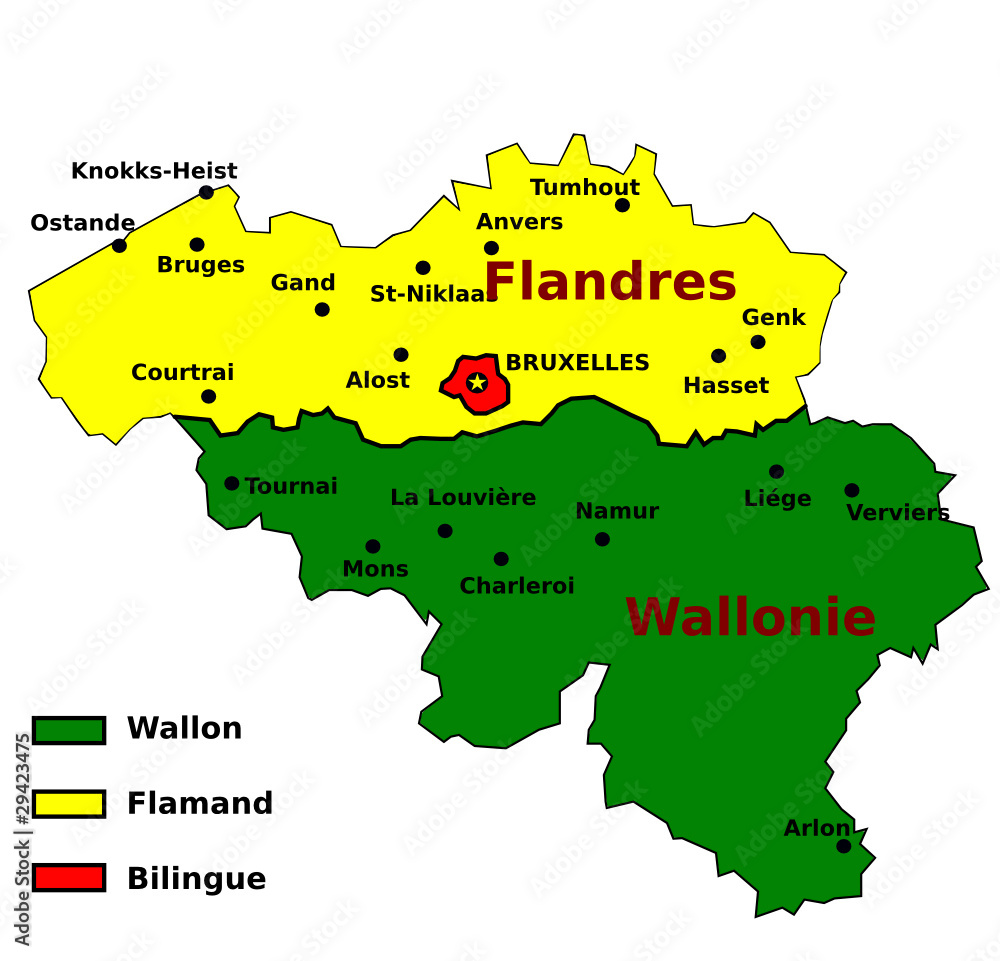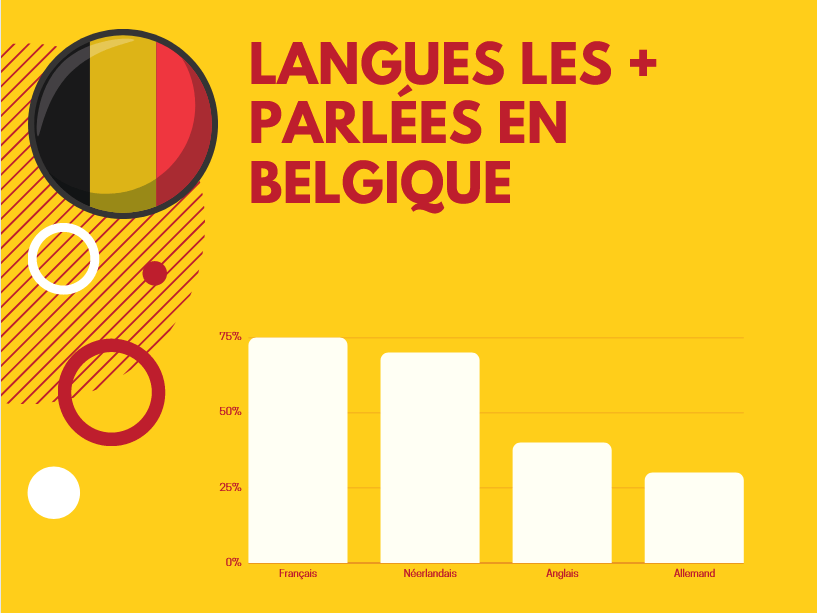Which Language Do They Speak In Belgium? A Deep Dive Into The Linguistic Tapestry
Ever wondered what language they speak in Belgium? Well, buckle up because we’re diving deep into the linguistic labyrinth of this fascinating country! Belgium might be small, but it’s a powerhouse when it comes to languages. With three official languages—Dutch, French, and German—you might think it’s a simple story, but oh no, there’s so much more to uncover. So, whether you're planning a trip or just curious, this article will break it all down for you.
Belgium is often referred to as a melting pot of cultures, and its linguistic diversity plays a huge role in that. It’s not just about speaking one language; it’s about understanding the nuances of each region and how they interact. From the bustling streets of Brussels to the quaint villages in Wallonia, every corner has its own linguistic flavor. Stick around, and we’ll explore it all!
Before we dive into the nitty-gritty, let’s set the stage. Belgium is a country that thrives on diversity, and language is a key part of that. While some might find the multilingual setup confusing, Belgians wear it like a badge of honor. So, let’s unravel the mystery of "quel langue parle t on en belgique" and see what makes this nation tick.
- Watch Hindi Movies Online Your Guide To Streaming Downloads
- Hdhub4u Your Guide To Free Movies Streaming Tips
Table of Contents
- Languages Spoken in Belgium
- Official Languages of Belgium
- Regional Dialects and Variations
- The Linguistic Scene in Brussels
- The Flemish Community and Dutch
- The Walloon Community and French
- The German-Speaking Community
- A Brief History of Language in Belgium
- Language Education in Belgium
- The Cultural Impact of Multilingualism
Languages Spoken in Belgium
Alright, let’s get down to business. In Belgium, you’ll find three main languages being spoken: Dutch, French, and German. But here’s the twist—each region has its own twist on these languages too. For instance, the Dutch spoken in Flanders is slightly different from what you’d hear in the Netherlands. And French? Well, the Belgian French has its own unique flair.
So, what does this mean for visitors or expats? It means you’ve got options! Depending on where you go, you might need to adjust your language skills a bit. But don’t worry, Belgians are known for their adaptability and often speak multiple languages fluently. It’s like having a built-in translator!
The Three Official Languages of Belgium
Belgium officially recognizes three languages: Dutch, French, and German. These languages are more than just communication tools; they’re reflections of the country’s rich history and cultural diversity. Let’s break it down a bit:
- Tamilblasters Is It Safe Find Movies Legal Alternatives
- Alyx Star Hottest Xxx Scenes Videos Find Them Here
- Dutch: Spoken by about 60% of the population, mainly in the northern region of Flanders.
- French: Spoken by around 40% of Belgians, primarily in the southern region of Wallonia.
- German: Spoken by a smaller community in the eastern part of the country, near the German border.
Each of these languages has its own governing body, ensuring that they’re preserved and promoted. It’s a system that works, even if it can be a bit complicated at times.
Regional Dialects and Variations
Now, here’s where things get interesting. Beyond the official languages, Belgium is home to a variety of regional dialects. In Flanders, you’ll find West Flemish, East Flemish, Brabantian, and Limburgish. Each one is distinct and adds to the linguistic richness of the region.
In Wallonia, the French dialects vary from city to city. Liège, for example, has its own unique accent and vocabulary. And let’s not forget about the German-speaking community, where dialects like Luxembourgish and Aachen German are still alive and well.
These dialects are more than just variations of the official languages; they’re a testament to the country’s deep-rooted traditions and local identities.
The Linguistic Scene in Brussels
Brussels, the capital of Belgium, is a linguistic battleground. Officially bilingual, you’ll hear both Dutch and French spoken here. But here’s the kicker—Brussels has a strong French-speaking majority, which can sometimes overshadow the Dutch presence.
That said, English is becoming increasingly popular, especially among younger generations. So, if you’re visiting Brussels and don’t speak either language, don’t panic. Chances are, you’ll still be able to communicate just fine.
The Flemish Community and Dutch
The Flemish community, located in the northern part of Belgium, is predominantly Dutch-speaking. But don’t be fooled into thinking it’s the same Dutch you’d find in the Netherlands. Flemish Dutch, or Vlaams, has its own set of vocabulary, grammar, and pronunciation rules.
For instance, you might hear words like "fiets" for bike in the Netherlands, while in Flanders, they’d say "raf." Small differences, but they add up. And let’s not forget about the famous Flemish sense of humor, which often plays on these linguistic quirks.
The Walloon Community and French
Down south, the Walloon community speaks French, but again, it’s not your average Parisian French. Walloon French has its own unique vocabulary and pronunciation, influenced by the region’s history and neighboring languages.
For example, you might hear "quai" instead of "quai" for dock, or "bal" instead of "bal" for dance. These small differences might not seem like much, but they’re part of what makes Walloon French so special.
The German-Speaking Community
In the far east of Belgium, near the German border, lies the German-speaking community. It’s the smallest of the three official language communities, but don’t let that fool you. This region is rich in culture and tradition, and the German language plays a central role.
Here, you’ll find a blend of German and local dialects, creating a unique linguistic environment. And while the community is small, it’s fiercely proud of its language and heritage.
A Brief History of Language in Belgium
To truly understand the linguistic landscape of Belgium, you need to look at its history. The country has been influenced by various cultures over the centuries, from the Romans to the Austrians to the French. Each one left its mark on the language.
For example, the French influence is evident in the French-speaking regions, while the Dutch influence is strong in Flanders. And the German influence? Well, that’s most apparent in the eastern part of the country.
Understanding this history helps explain why Belgium has such a rich and diverse linguistic tapestry.
Language Education in Belgium
Education plays a crucial role in maintaining Belgium’s multilingual society. Schools in Belgium teach in the official language of the region, but students are also encouraged to learn other languages. For instance, in Flanders, students often learn French as a second language, while in Wallonia, they might learn Dutch or English.
This emphasis on language education ensures that Belgians are well-equipped to communicate across regions and cultures. And it’s not just about practicality; it’s about fostering understanding and respect for each other’s traditions.
The Cultural Impact of Multilingualism
Finally, let’s talk about the cultural impact of Belgium’s multilingualism. It’s not just about speaking different languages; it’s about embracing different perspectives and ways of life. This diversity enriches the country’s cultural landscape, making it a vibrant and dynamic place to live.
So, the next time someone asks you "quel langue parle t on en belgique," you can confidently say that it’s a bit of everything. And isn’t that what makes Belgium so special?
Conclusion
Belgium’s linguistic diversity is a testament to its rich history and cultural heritage. From the official languages of Dutch, French, and German to the myriad of regional dialects, every corner of the country has its own unique voice. Understanding this diversity not only enhances our appreciation of Belgium but also highlights the importance of embracing multilingualism in our increasingly globalized world.
So, whether you’re planning a trip to Brussels, exploring the charming streets of Bruges, or hiking in the Ardennes, remember that language is more than just a tool for communication—it’s a bridge to understanding and connection. Share your thoughts in the comments below, and don’t forget to check out our other articles for more insights into the fascinating world of languages!



Detail Author:
- Name : Dr. Elna Hodkiewicz
- Username : rsmith
- Email : koss.jesus@stracke.net
- Birthdate : 1997-11-08
- Address : 135 Cathrine Fall Suite 038 Feilside, WA 91203-8822
- Phone : +1-360-939-4401
- Company : Schinner Ltd
- Job : Diamond Worker
- Bio : Culpa et enim veritatis enim. Numquam nobis dolore tempora voluptatibus.
Socials
linkedin:
- url : https://linkedin.com/in/casperl
- username : casperl
- bio : Et et qui eaque cupiditate tempora.
- followers : 4582
- following : 400
twitter:
- url : https://twitter.com/loyce.casper
- username : loyce.casper
- bio : Qui temporibus temporibus asperiores. Et ut repellat molestias nisi consectetur. Totam a vitae quia repellat alias voluptas sunt.
- followers : 4053
- following : 448
facebook:
- url : https://facebook.com/lcasper
- username : lcasper
- bio : Quia praesentium corrupti qui voluptatum.
- followers : 551
- following : 2384
instagram:
- url : https://instagram.com/loyce3403
- username : loyce3403
- bio : Eligendi dolorem esse id eveniet quos id. Dolores est est voluptatem quam.
- followers : 5221
- following : 1395
tiktok:
- url : https://tiktok.com/@casperl
- username : casperl
- bio : Doloribus aut sint deserunt ut mollitia non expedita velit.
- followers : 4924
- following : 2051